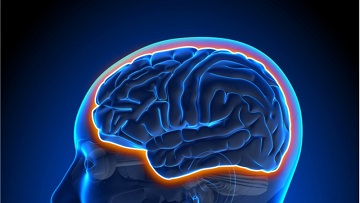MUST READ! COVID-19 News: SARS-CoV-2 Altered Blood-Brain Barrier Opens Questions About Drugs Used During Treatments And Their Effects!
COVID-19 News - SARS-CoV-2 Altered Blood-Brain Barrier - Drug Transport Apr 01, 2023 2 years, 2 weeks, 5 days, 17 hours, 11 minutes ago
COVID-19 News: A new study by Mexican medical scientists has found that SARS-CoV-2 virus is able to alter the Blood-Brain Barrier of the human host with concerning implications as many of the drugs used during treatment can also thereafter gain access to the brain when in the first place, during development and research, they were made knowing very well that their active molecules would never be able to cross over the Blood-Brain Barrier!

The discovery opens a pandora box as scientists now need to research and understand what are the possible side effects of many of these drugs used during COVID-19 and Post COVID and their effects on the brain as many are now able to cross over the altered or damage Blood-Brain Barrier.
A wide array of neurological symptoms has been reported in patients with SARS-CoV-2 disease (COVID-19), including stroke, ataxia, meningitis, encephalitis, and cognitive impairment. These conditions can cause serious sequelae or death and are associated with the entry of SARS-CoV-2 into the Central Nervous System (CNS).
The study team highlight mechanisms by which SARS-CoV-2 interacts with the blood-brain barrier (BBB) and its involvement in the passage of drugs into the CNS.
The study team performed a search in PubMed with the terms “COVID-19” or “SARS-CoV-2” and “blood-brain barrier injury” or “brain injury” from the year 2019 to 2022.
They found proposed evidence that SARS-CoV-2 infects neurovascular cells and increases BBB permeability by increasing the expression of matrix metalloproteinase-9 that degrades type IV collagen in the basement membrane and through activating RhoA, which induces restructuring of the cytoskeleton and alters the integrity of the barrier.
The breakdown of the BBB triggers a severe inflammatory response, causing the cytokine storm (release of IL-1β, IL-6, TNF-α, etc.) characteristic of the severe phase of COVID-19, which includes the recruitment of macrophages and lymphocytes and the activation of astrocytes and microglia.
The study team concluded that the increased permeability of the BBB would allow the passage of drugs that would not reach the brain in a normal physiological state, thus enhancing certain drugs’ beneficial or adverse effects.
The study findings encourage research on the impact of drugs on patients with COVID-19 and recovered patients with sequelae, focusing mainly on possible dose adjustments and changes in pharmacokinetic parameters.
The study findings were published in the peer reviewed journal: Frontiers In Cellular Neuroscience.
https://www.frontiersin.org/articles/10.3389/fncel.2023.1125109/full
SARS-CoV-2, a highly contagious virus responsible for the COVID-19 pandemic, has wreaked havoc on global health. This tiny invader, characterized by its distinctive spiked protein envelope, has been shown to infect various organs, including the brain as covered by many studies and
COVID-19 News reports. The virus's
ability to infiltrate the brain, causing neurological complications such as seizures, encephalitis, and cerebrovascular injury, has sparked immense interest among researchers seeking to understand the underlying mechanisms.
A Complex Blood-Brain Barrier (BBB) Damaged And Altered
The blood-brain barrier (BBB) acts as a fortress, protecting the brain from harmful substances and pathogens. This dynamic structure is made up of endothelial cells (ECs) connected by tight junctions, which limit the movement of substances, and is supported by pericytes, astrocyte end-feet, and vascular smooth muscle cells. Disrupting the BBB's integrity could have dire consequences, as pathogens, toxins, and immune cells could invade the brain, leading to a cascade of unwanted effects.
SARS-CoV-2 enters the body through the respiratory system and binds to ACE2 receptors found in various organs, including the brain. The virus can also infiltrate the brain through the olfactory nerve or the gastrointestinal system, but the focus here is on the BBB.
The virus's ability to penetrate the BBB hinges on a series of complex molecular interactions involving key proteins like the spike glycoprotein and ACE2 receptors.
The immune response to SARS-CoV-2 is a double-edged sword. While it can help neutralize the infection, it can also trigger a cytokine storm, an intense and often deadly hyperinflammatory state. This cytokine storm damages the BBB, increasing vascular permeability and facilitating the virus's entry into the central nervous system. Microglial activation and subsequent release of cytokines further amplify neuroinflammation, leading to a vicious cycle of damage.
SARS-CoV-2 infection can lead to the BBB's rupture through mechanisms such as the activation of RhoA and the overexpression of matrix metalloproteinase-9 (MMP9). This increased permeability allows the virus to infiltrate the brain through both transcellular and paracellular pathways.
Implications for Drug Transport
The altered BBB permeability has significant implications for drug transport, as medications that typically do not cross the BBB might now do so, causing toxic effects or exacerbating existing side effects. For instance, antivirals such as oseltamivir have been associated with neurological toxicity, and neuromuscular blocking agents like rocuronium may cause adverse CNS reactions when the BBB is compromised.
Conclusion
The SARS-CoV-2 virus's ability to penetrate the BBB and cause neurological complications is a fascinating and crucial area of research. Understanding the mechanisms behind this invasion could have significant implications for the development of effective treatments and interventions. As the world continues to grapple with the COVID-19 pandemic and its aftermath, unraveling the mysteries surrounding SARS-CoV-2's impact on the brain remains a high priority for the scientific community.
For the latest
COVID-19 News, keep on logging to Thailand Medical News.
